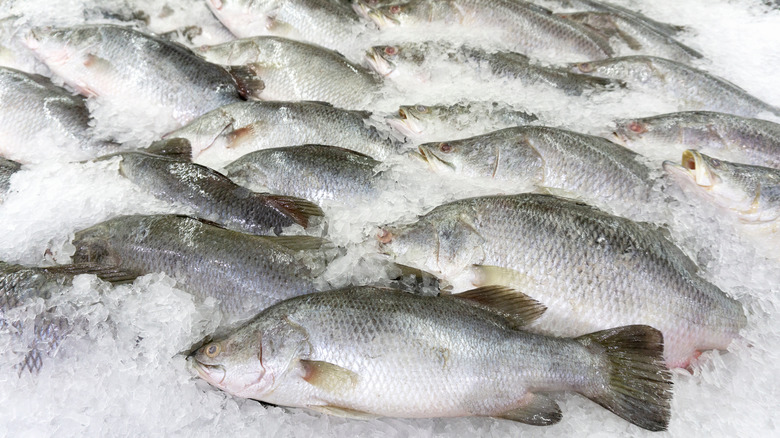The Real Reason Frozen Fish Is Almost Always Better Than Fresh
For fish and seafood lovers, living in a coastal town and enjoying the daily catch fresh off the boat is the dream. However, many people don't have direct access to fish and stick to purchasing it from supermarkets. Although we are constantly reminded to eat fresh foods, when it comes to fish, unless you are buying it from the source, you're better off choosing frozen.
While it might seem counterintuitive, if stored properly, frozen fish is actually fresher than fish labeled as fresh. Before you scoff, think of the long journey the fish took from the boat to the port, then to a storage facility, before finally being distributed to a supermarket. Depending on how closely located you are to a large body of water, The Washington Post indicates that the so-called fresh fish might be weeks old. AllRecipes also notes that fish labeled as fresh might have been frozen and thawed, and it's hard to know the exact conditions under which this occurred.
Flash freezing occurs very quickly at low temperatures, either on the boat or at port, explains Afishionado. This preserves the characteristics of freshly caught fish until the consumer purchases it and thaws it at home. As Epicurious remarks, the fish basically remains in season longer since it is stable from the time it is caught. In contrast, if you buy fish labeled fresh that is not in season, it has been defrosted and there's no telling how fresh it is once it reaches you.
What are the benefits of frozen fish?
A study by the National Fish and Wildlife Foundation measured cellular decomposition among samples of fresh and frozen fish and concluded that frozen fish was significantly higher quality. Consumers noticed it too, sharing their views about appearance, aroma, flavor, texture, quality, overall liking, and purchase intent. Across all factors, participants preferred the frozen fish or found it equal to the fresh one.
Since we're always told fresh is better, the natural question consumers have is whether frozen fish is as nutritious. Afishionado confirms it is almost identical, except for a small number of nutrients lost in the water during thawing. Besides the nutritional content, as far as health goes, flash freezing prevents bacterial growth in the fish according to Afishionado.
If you're still not convinced, frozen fish is also the environmentally-friendly option (via Afishionado). If fish is sold fresh without being frozen, it must be transported as quickly as possible via air travel. Meanwhile, fish that is kept properly frozen can be shipped by boat or train, minimizing the impact on carbon dioxide emissions. Besides saving the planet filet by filet, the reduced costs are also transferred to the consumer (via Epicurious).
When you plan to cook frozen fish, the U.S. Food & Drug Administration recommends thawing it slowly, ideally in the refrigerator overnight. If you are short on time, the FDA suggests leaving the sealed package in cold water or defrosting it in the microwave if you are ready to cook it.

